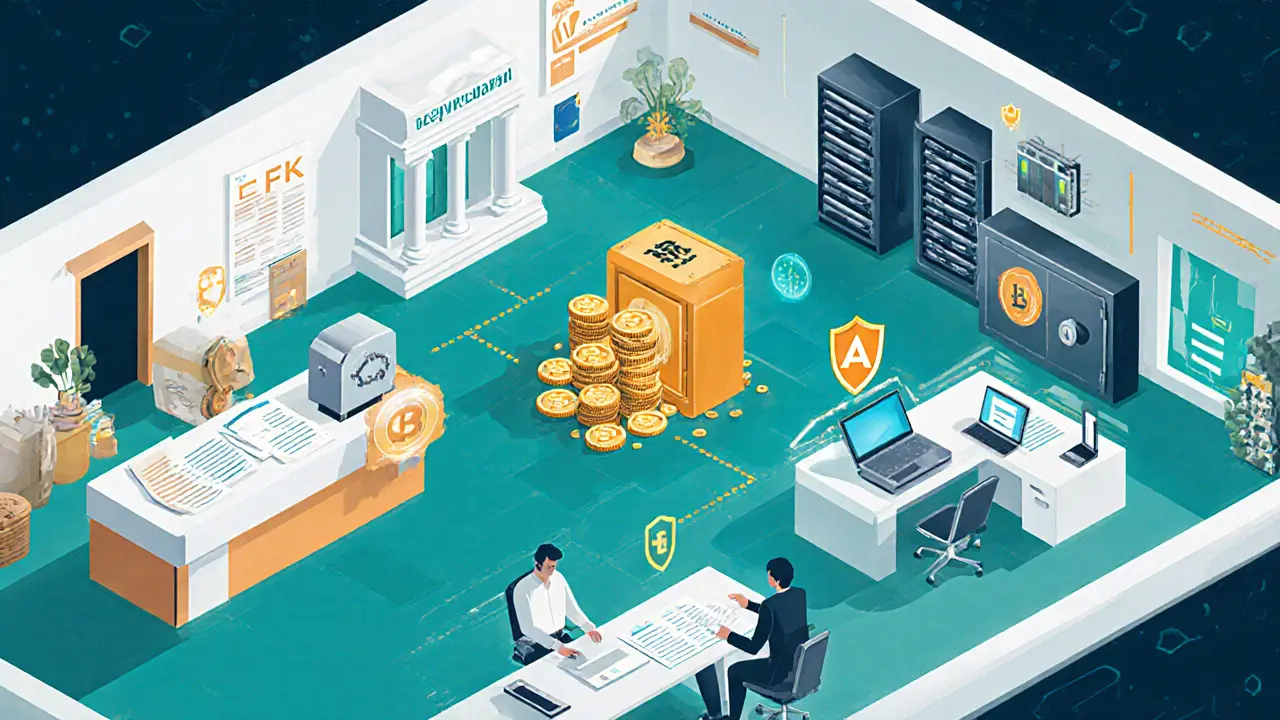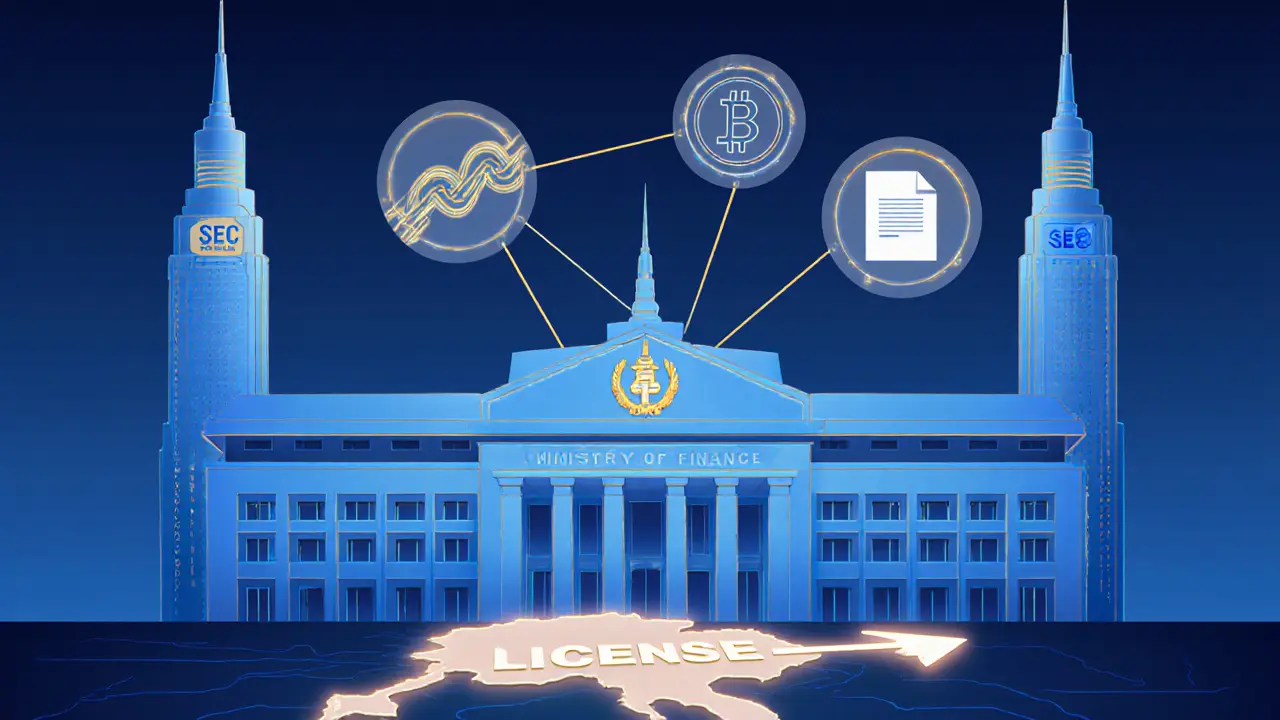Thailand Crypto Exchange License Calculator
License Category
Estimated Licensing Costs
Capital Requirement: -
Application Fee: 2.5 million THB
Estimated Legal & Compliance Costs: -
Total Estimated Initial Investment: -
Annual Compliance Costs (approx.): -
Note: This calculator provides estimates based on current regulations. Actual costs may vary depending on operational complexity, legal fees, and compliance measures.
License Requirements Overview
| License Type | Minimum Capital (THB) | Annual Compliance Cost (USD) |
|---|---|---|
| Digital Asset Exchange | 50 million | 200,000 |
| Digital Asset Broker | 30 million | 150,000 |
| Digital Asset Dealer | 20 million | 100,000 |
Quick Summary
- Licensing is overseen by the Ministry of Finance and the SEC; three main categories apply: exchange, broker, dealer.
- Minimum share capital is 50millionTHB (≈1.4MUSD) plus a 2.5millionTHB application fee.
- The full registration process averages 150days after company incorporation.
- Foreign operators must comply with the April2025 amendments and obtain a local license.
- Ongoing AML‑CFT, KYC, and cybersecurity compliance are mandatory for the life of the license.
Thai crypto exchange license is the official permission issued by Thailand’s Ministry of Finance, with day‑to‑day supervision by the Securities and Exchange Commission (SEC). The license allows a firm to operate a digital‑asset exchange, broker, or dealer for Thai residents.
Regulatory Landscape in Thailand
Thailand’s framework began with the Emergency Decree on Digital Asset Businesses B.E.2561 (2018) and was overhauled by the Royal Decree No.2 B.E.2568 (effective 13April2025). The Ministry of Finance issues the license, while the SEC monitors compliance, conducts inspections, and maintains the public registry of licensed operators.
The 2025 amendment closed a loophole for overseas platforms: any foreign digital‑asset business offering services to Thai users must now secure a local license, proving a Thai‑registered entity, local capital, and compliance infrastructure.
License Categories and Core Requirements
Three principal categories exist, each with its own capital threshold, permitted activities, and supervisory focus.
| Category | Minimum Share Capital | Primary Regulator | Typical Services |
|---|---|---|---|
| Digital Asset Exchange | 50millionTHB | SEC | Order‑book trading, market‑making, listing of tokens |
| Digital Asset Broker | 30millionTHB | SEC | Matching buyers and sellers, over‑the‑counter trades |
| Digital Asset Dealer | 20millionTHB | SEC | Buying/selling crypto for own account, custodial services |
Other licensed activities-ICO portals, custodial wallets, fund managers, and advisors-have lower capital floors (10-15millionTHB) but face the same AML‑CFT regime.
Financial Commitment and Fees
Beyond the share‑capital deposit, applicants pay a non‑refundable processing fee of 2.5millionTHB. The overall upfront outlay therefore sits around 52.5millionTHB (≈2.1MUSD). These funds must sit in a Thai‑based bank account before the Ministry of Finance will accept the application.
Legal and compliance consulting costs typically add another 500,000USD, especially for foreign firms that need to set up a Thai subsidiary, hire local staff, and procure audit services.
Step‑by‑Step Application Process
- Incorporate a Thai company: Register a limited company with at least 51% Thai ownership (or a locally registered joint‑venture for foreign‑only entities).
- Open a Thai bank account and deposit the required share capital.
- Draft AML‑CFT and KYC policies that meet SEC Circular 2025‑01 standards.
- Prepare technical documentation: system architecture, cybersecurity controls, data‑privacy impact assessment.
- Engage a licensed Thai auditor to review financial statements and internal controls.
- Submit the application package to the Ministry of Finance, including:
- Company registration certificate
- Share‑capital proof
- Business plan with cash‑flow forecasts
- Profiles of the executive team
- AML‑CFT manual and KYC workflow
- IT security policy and penetration‑test report
- Pay the 2.5millionTHB fee via the designated Ministry portal.
- Wait for the 150‑day review period. The SEC may request additional documentation or onsite inspections.
- Upon approval, publish the license number on your website and register with the SEC’s public registry.
Getting a Thai crypto exchange license often takes 6‑12months from the start of incorporation to final approval, because of the extensive documentation and the need for local legal counsel.

Ongoing Compliance Obligations
Licensing is just the beginning. Every licensed entity must maintain:
- AML‑CFT monitoring: real‑time transaction screening, suspicious‑activity reporting to the Anti‑Money Laundering Office (AMLO).
- KYC verification: ID, proof of address, source‑of‑funds checks for all Thai users.
- Cybersecurity standards: ISO27001‑aligned controls, regular penetration testing, incident‑response plan approved by the SEC.
- Quarterly financial reporting to the Ministry of Finance and the SEC, audited by a Thai CPA firm.
- Annual license renewal with updated AML‑CFT policies and a refreshed business plan.
Failure to comply can trigger fines up to 10% of monthly revenue or revocation of the license.
Special Considerations for Foreign Operators
The April2025 amendment requires any foreign platform targeting Thai residents to:
- Establish a locally incorporated Thai entity (minimum 51% Thai shareholding unless a special JV is approved).
- Appoint a resident compliance officer who holds a professional AML certification.
- Maintain a local treasury account for all Thai‑resident transactions; cross‑border fund flows must be justified.
- Submit a “Foreign Service Impact” statement describing how the platform will support the Thai digital‑asset ecosystem.
These rules close the previous “offshore‑only” loophole and give Thai investors the same protection they enjoy with domestic providers.
Practical Checklist for Applicants
| Item | Completed? |
|---|---|
| Thai company registration (51% Thai ownership) | |
| Bank account with 50MTHB capital deposit | |
| AML‑CFT policy aligned to SEC Circular 2025‑01 | |
| KYC workflow & verification vendor | |
| IT security architecture & ISO27001 audit | |
| Business plan with 12‑month cash‑flow forecast | |
| Executive team CVs & qualifications | |
| Legal counsel and Thai audit firm engaged | |
| Application fee payment (2.5MTHB) |
Common Pitfalls and Pro Tips
- Under‑estimating the timeline: Companies often start the application before the capital is fully transferred, causing a pause during the 150‑day review.
- Missing local staff requirement: The SEC expects at least two Thai‑qualified employees in compliance and operations.
- Inadequate AML system: Off‑the‑shelf KYC tools may not meet the SEC’s real‑time screening rule; integrate a solution that can query Thailand’s blacklist API.
- Neglecting cybersecurity audits: A failed penetration test will be flagged immediately and delay the license.
- Ignoring the foreign‑operator clause: Foreign firms that launch a beta without a Thai license risk a heavy fine and a forced shutdown.
Future Outlook
Thailand is gearing up to regulate DeFi protocols and NFT marketplaces, hinting at a possible “Digital Asset Service Provider” license tier in 2026. For now, the clear, detailed framework makes Thailand one of the most credible crypto hubs in Southeast Asia, rivaling Singapore and Hong Kong while offering stronger investor protection.
Frequently Asked Questions
How long does it take to get a Thai crypto exchange license?
The Ministry of Finance typically takes about 150days to review a complete application. Including the 1‑3months needed for company setup, most firms see a total timeline of 6‑12months.
Do foreign companies need a local partner?
Yes. The April2025 amendments require a Thai‑registered entity with at least 51% Thai ownership, or a formally approved joint‑venture, to obtain a license for services offered to Thai residents.
What is the minimum capital for a digital‑asset exchange?
The law mandates a share capital of 50millionTHB (about 1.4millionUSD) that must be fully paid into a Thai bank before the license can be granted.
Are there ongoing reporting requirements?
Licensees must submit quarterly financial statements, annual AML‑CFT audits, and a yearly renewal packet that updates the business plan and compliance framework.
Can I operate a custodial wallet service without a full exchange license?
Custodial wallet providers need a separate “Digital Asset Custody” license, which has a lower capital floor (around 15millionTHB) but still requires the same AML‑CFT and cybersecurity standards.


Author
Ronan Caverly
I'm a blockchain analyst and market strategist bridging crypto and equities. I research protocols, decode tokenomics, and track exchange flows to spot risk and opportunity. I invest privately and advise fintech teams on go-to-market and compliance-aware growth. I also publish weekly insights to help retail and funds navigate digital asset cycles.